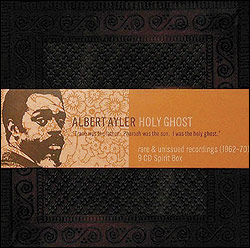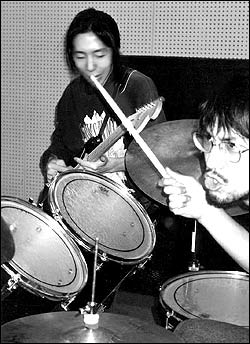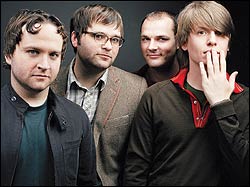The Fiery Furnaces play chicken with narrative on Blueberry Boat (Rough Trade). Eleanor and Matthew Friedberger, the siblings behind the band, have mentioned in interviews that the Who’s multipart mini-operas “A Quick One” and “Rael” inspired the way they put together their second album’s songs—four of them over eight minutes long, another one close. On a surface level, there are only a few Who-ish gestures here, like the drum flourishes and suspended-to-major-chord resolutions of “Chris Michaels.” Still, they’ve picked up a couple of other tricks from Pete Townshend’s suites: quick-cut scene changes and melodic motifs that recur in altered forms.
Fiery Furnaces songs act like compressed dramas—with characters, settings, and events—only to veer away when it comes time to fix a plot in place. “Chris Michaels” opens with prickly, mean suburbanites quibbling: “Remember that girlfriend of Al’s?/Well, we were pals/Today she was angry came up/And said, You’re so so stup’ It’s all distrup’/You’re blah blah this this that so now sh’up/You messed me up.” And then, abruptly, it jump-cuts to somebody stealing a credit card and flying to India, where the story gets squeezed into incomprehensibility: an umbrella vendor, leg irons, a pickax, maybe another airplane. Still, the melody in the India section is a variation on one we’ve heard earlier in the song—we’re supposed to be making a connection somehow.
The same thing happens throughout the album. “Chief Inspector Blancheflower” starts with Matt singing over woozy electronic buzz and hand claps about his character’s failure to become a typewriter repairman. He trails off into a mumble, then perks up again for a final line: “So I joined the police force.” Eleanor takes over and starts singing about investigating a heavily armed farmer who’s suspected of killing his wife, but that section derails quickly, too, with the aid of an out-of-nowhere backward guitar solo. Then Matt sings a discofied passage as a “local fratricider,” explaining how he fell out with his little brother, who’d started seeing his ex-girlfriend (whose lines get sung by Eleanor). “So I drove up to Springfield in my wife’s new car/And went and had a drink at my buddy’s old bar,” he concludes, without mentioning the murder. Does all this fit together? The music says so, even if the words don’t.
There’s nobody writing more daring song lyrics than the Friedbergers right now—they fall on their noses a lot more often than most songwriters, but they also pull off stuff that feels totally fresh. “Straight Street” is a barrage of place names and incidents, narrated by a failed Ericsson cell phone salesperson at an Internet cafe in Damascus; whatever else you can say about it, it’s not overfamiliar territory. Blueberry Boat‘s 10-minute opener, “Quay Cur” (that title’s one of those nose-bruisers), includes a flurry of words that sound more or less believable as nautical slang (“A looby, a lordant, a lagerhead, lozel/A lunglo, lathback made me a proposal”) and eventually disintegrate into babble: “Unuiche quaysah/Maconmeg/And I gave a sasooneg.”
At their recent live shows, the Fiery Furnaces have been splitting “Quay Cur” into sections, scattering it through their set—less as a framing story than as one more kiss-off to narrative coherence. Maybe they’re suspicious of spelling everything out (the one time they do on Blueberry Boat, it’s literally a shaggy-dog story), or maybe they just like making their listeners work hard.
Ken Stringfellow’s songs are smooth and burnished where the Furnaces’ are sour and tense, but he’s got the same kind of uneasy relationship with storytelling. If you didn’t understand English, Stringfellow’s Soft Commands (Yep Roc) would be a splendid soft-rock album, nothing mysterious about it beyond occasional stylistic quirks like the instrumental dub reprise that follows “You Become the Dawn.” Stringfellow is half of the Posies’ core and a part-time R.E.M. and Big Star sideman, and he can evoke pretty much anyone’s style he aims for, with precision—the chorus of “When U Need Someone” is not just an homage to the Beach Boys, it’s a note-perfect evocation of their harmonies and arrangements circa 1973.
Pay attention to its words, though, and it gets a lot stranger. There’s something going on, perhaps involving a president—”A man, his hand on the free world”; “He speaks through a speechwriter”—who’s “driving to the make-out point on the shores/Of the lake of the damned.” We hear at least his half of a conversation, but it doesn’t make much sense; there’s something about electrocuting a prisoner, something about playing old records and romantic obsession. And every minute or so, the increasingly baffling story gets put aside for that huge Brian Wilson–ized chorus. It tells us that the plot should be advancing—which it isn’t, exactly.
The standard lyrical mode for these sorts of songs (“Let Me Do” is just this side of mid-’70s Eric Carmen power balladry, complete with strings and horns) isn’t narrative at all: They’re traditionally supposed to outline a familiar emotional state. There’s a “me” and a “you” on most of Soft Commands, but Stringfellow keeps hinting at stories, slipping fragments of plot and curiously specific details into his lyrics. “Take the baby’s cane away and hide his little braces/Left to his devices he still wants that rocky road/Feed him all your fables and your periodic tables,” “You Drew” begins. (The chorus continues from the title: ” . . . the poison from me.”)
What’s going on here? It’s pretty clear that Stringfellow knows, but he’s not letting on. That may be the point: to lure listeners into thinking that they understand the simple pleasures of what they’re hearing, and then make it clear that, as smoothly as a pop song can go down, it’s more complicated than it seems.








